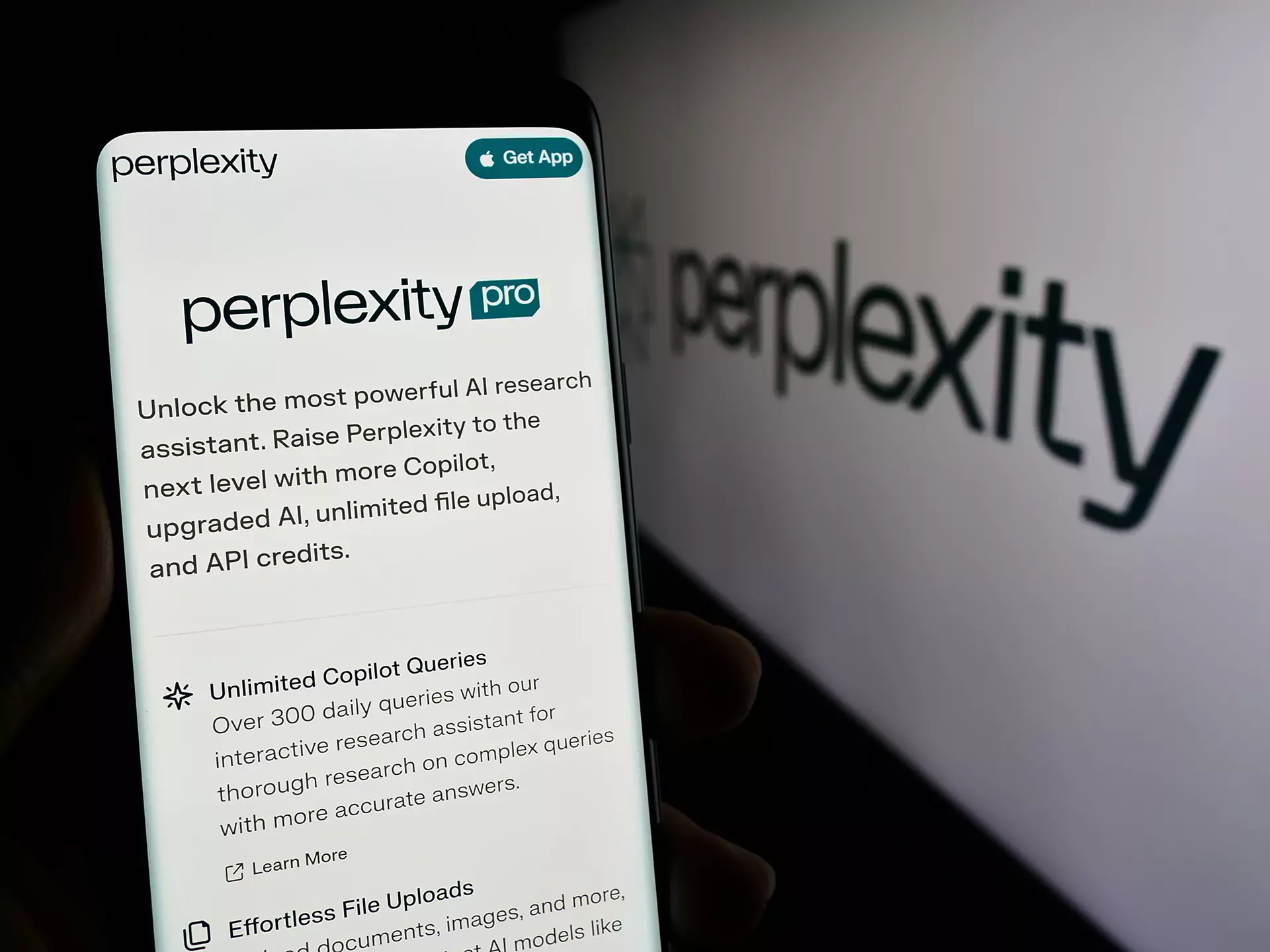Internet search as we know is changing, and changing quickly. It’s different today than yesterday, and likely will be different next week, and next month.. Old-school search engines like Google have been the top dogs for a long time, with users displaying brand loyalty to a company that has reigned supreme in the internet kingdom. But, there’s a new shiny technology on the block, and it’s something to be reckoned with. Perplexity AI is determined to change things, and is already taking market share from Google.
Perplexity AI stands out from other search engines by using advanced conversational AI to directly answer your questions comprehensively, with sources cited for verification, rather than just providing links to potentially relevant webpages. This is not just a small improvement; it changes how we interact with information online.
Perplexity AI has caught the attention of big investors like Jeff Bezos, engineers from OpenAI, and former Google employees. With these big names backing it, it’s no surprise that Perplexity is making a big impact. The site gets 55 million visits a month, and while that may seem small in comparison to Google’s 80+ billion monthly users, the number has been increasing exponentially throughout the past year and will likely continue to increase.
The Evolution of Online Search
Think back to the early days of the internet. Finding information online was new and exciting. You’d use a search engine like Google or Yahoo, type a few words about something you wanted to know, and hit enter. In seconds, you’d get a list of websites that contained information on what you wanted. What a revelation! For a society that used to gather information from Encyclopedia Britannica and take long trips to the library, this new and quick way to gather information using a few words was truly revolutionary.
But as the internet grew with more information than anyone could ever read, the problems with this keyword-based search model became clear. Often, the results didn’t actually answer what you were looking for. The web pages felt disconnected, like a scavenger hunt to piece together the full story.
For simple factual questions like “What’s the capital of France?” it worked fine. However, the experience was lacking for more complex questions covering multiple topics. It was like being given a pile of book excerpts when you really needed the whole story explained.
As our lives became more connected with digital technology, our expectations also grew. We not only wanted information faster, but we wanted it presented in a way that felt natural and conversational—like talking to a knowledgeable person who understood the context and intent behind our questions.
We got frustrated having to twist our natural language into short, keyword-based guesses about what web content might help us. We wanted a more engaging, personalized, and open-ended search experience without these limits. The old keyword approach was like being given a toolbox when you really wanted an insightful guide to lead you through the project every step of the way.
So, while tools like Google helped us realize the internet’s vast potential, the core model of typing words into a box and getting disconnected web pages could only take us so far. A new approach was needed to evolve how we navigated and experienced the wealth of human knowledge now available at our fingertips.
The Search Engine Re-imagined
Just when we thought internet search had stagnated, a new approach brought it back to life—conversational AI.
Leading this revolution is Perplexity AI. It represents a radically different vision for how we’ll find information in the digital age.
Instead of the old “keyword into a box” routine, Perplexity lets you search in plain, natural language—just like having a conversation. You simply ask it questions as you would a knowledgeable friend.
But Perplexity is more than just an interface. It actually understands the context and nuances behind your queries using advanced artificial intelligence. This allows it to comprehend the true intent behind your questions.
Perplexity doesn’t just match keywords and give a list of potentially relevant web pages like old-school search engines. By using cutting-edge language models and machine learning on a vast knowledge base, it creates complete overviews that form an understandable narrative.
It’s like having a knowledgeable tutor who can discuss any topic you’re curious about in-depth, explaining underlying concepts and making insightful connections along the way based on your interactive dialogue.
Perplexity provides information from credible, fact-checked sources—not unverified user-generated content. And it keeps the conversation flowing, asking for clarification on ambiguities and suggesting new related topics to expand your understanding.
Comparing Conversational AI to Google’s New Approach
While Perplexity is pioneering, even tech giants have noticed this conversational AI movement for searching. Google recently introduced its own “overview” feature, powered by AI language models.
However, Perplexity goes beyond Google’s approach. The key difference? Perplexity treats searches as an open-ended, back-and-forth dialogue—not just one-way data retrieval.
With Google’s overviews, you still start by typing keywords into that familiar search box. Google then uses AI to generate a summary paragraph with relevant snippets from web pages it has indexed.
It’s more advanced than the list of blue links we’re used to, but the experience is still the same: you ask a question, and an AI surfaces and stitches together information to respond.
Perplexity completely changes this. The AI doesn’t wait for you to type queries into boxes. You simply speak or type your questions in plain language, just like you’d ask a friend.
Perplexity fully understands the context and intent behind your words using its advanced AI. It asks for clarification on ambiguities, suggests related topics to explore based on your interests, and facilitates an organic back-and-forth conversation.
Only once it truly understands your unique information needs does Perplexity create a cohesive narrative overview customized for you in that moment—not just extracting and repackaging third-party data.
The difference is like receiving a prepared report from Google versus an interactive session from Perplexity based on your personal interests.
This highlights the fundamental difference in their models. Google is still anchored in the classic search paradigm of keyword queries prompting web results, even with AI. Perplexity completely changes this user experience for a continuously evolving two-way information exchange.
Challenges and Solutions
While conversational AI like Perplexity AI offers numerous benefits, it also faces several challenges that must be addressed to ensure effectiveness, reliability, and ethical use. Two of the most significant challenges are knowledge comprehensiveness and bias mitigation.
Knowledge Comprehensiveness
Ensuring that conversational AI provides accurate and comprehensive information is crucial for user trust and satisfaction. Perplexity AI tackles this challenge through the following strategies:
- Vast Knowledge Base: Perplexity AI leverages an extensive knowledge base that encompasses a wide array of topics. This breadth of information allows the AI to answer diverse queries effectively.
- Continuous Updates: To maintain the relevance and accuracy of the information, Perplexity AI continuously updates its data sources. This includes integrating new research, news, and data as they become available, ensuring that the AI’s responses reflect the latest information.
- Robust Information Retrieval: The AI employs advanced algorithms to retrieve the most pertinent information from its database. This ensures that responses are not only accurate but also contextually relevant to the user’s query.
- Expert Validation: In some cases, information provided by the AI is validated by subject matter experts. This adds an additional layer of accuracy, particularly for complex or highly specialized topics.
Bias Mitigation
AI systems, including conversational AI, can inadvertently perpetuate biases present in their training data. Perplexity AI addresses this challenge through several key strategies:
- Algorithmic Fairness: Perplexity AI incorporates principles of algorithmic fairness in its design. This involves developing algorithms that aim to treat all users equitably, regardless of their background or characteristics.
- Diverse Data Sets: To minimize biases, Perplexity AI is trained on diverse and representative data sets. This diversity helps to ensure that the AI’s responses do not favor any particular group unfairly.
- Ongoing Monitoring and Auditing: Bias detection is an ongoing process. Perplexity AI undergoes regular monitoring and auditing to identify and address any biases that may emerge over time. This includes analyzing user interactions and feedback to continuously refine the AI’s performance.
- User Feedback Mechanisms: Users are encouraged to provide feedback on the AI’s responses. This feedback is crucial for identifying potential biases and areas for improvement. By incorporating user feedback, Perplexity AI can adjust its algorithms and data sources to better serve all users.
Optimizing for the Conversational AI Shift
As groundbreaking technologies like Perplexity bring conversational AI into the mainstream, it will reshape how we experience and optimize for the search engine landscape.
The old method of cramming keywords and content into rigid web pages is becoming obsolete for succeeding in search. Instead, we need to explore ways to restructure content into comprehensive, free-flowing knowledge bases. In the conversational AI world, search results are dynamically generated overviews, not lists of links to individual pages.
This means moving away from unnatural keyword padding to creating content with authentic narratives in natural language across topics. We want exchanges to flow in context like an actual dialogue.
Enhancing content creation for voice and visual mediums is also crucial, as searches will increasingly happen through audio and camera interfaces rather than typing boxes.
Most importantly, developing guidelines to ensure content aligns with specific industry terminology and language is essential. Conversational AI excels at niche, sector-specific queries, but only when content matches how professionals communicate within those fields.
Technical Insights
The advanced technology behind Perplexity AI involves:
- AI Training: The language models are trained on diverse datasets to understand context and intent accurately.
- Natural Language Processing: NLP allows Perplexity AI to comprehend and respond to user queries in a conversational manner, providing a more intuitive search experience.
Ethical Considerations
The rise of conversational AI brings ethical implications:
- Privacy Concerns: Handling user data transparently and ensuring user consent is crucial.
- Ethical AI Development: Efforts to develop AI responsibly to prevent misuse and ensure fairness.
Future Prospects
Looking ahead, conversational AI could revolutionize various fields:
- Law Firms:
- Increased Access to Legal Information: AI-powered chatbots can provide basic legal information and answer frequently asked questions 24/7, improving access to justice for everyone.
- Streamlined Legal Processes: AI can automate repetitive tasks like document review and due diligence, freeing up lawyers to focus on complex legal issues and client strategy.
- Improved Client Communication: Conversational AI chatbots can answer client questions, schedule appointments, and provide case updates, keeping clients informed and engaged throughout the legal process.
- Education: Students could benefit from personalized AI.
- E-commerce: Virtual assistants could enhance the shopping experience.
Community and Expert Opinions
Experts from various fields have recognized the potential of conversational AI:
- Industry Leaders: AI researchers and developers praise Perplexity AI’s intuitive design and accuracy.
- Academic Perspectives: Studies from universities highlight the impact of conversational AI on user engagement and satisfaction.
A Future of Knowledge Democratization
As impressive as Perplexity and other conversational AI technologies are, we’re only seeing the start of their potential to change how we interact with and experience information.
Imagine a world where accessing knowledge is no longer a tough task—a world where finding answers feels as natural as a conversation with a knowledgeable friend. This is the future that conversational AI is bringing in.
Instead of having to translate our questions into awkward keyword strings, we’ll be able to ask questions freely using plain, everyday language on any topic. No more second-guessing how to phrase things for an algorithm to understand us.
And the responses won’t be blunt, out-of-context data dumps. They’ll come as fluent, insightful narratives painting a clear picture—a nuanced tapestry woven from the most relevant and credible information sources, customized for our unique context.
Here’s a potential ending that ties the rise of conversational AI and its impact on how we approach SEO for clients:
As a marketing agency focused on helping clients succeed with search engine optimization (SEO), the advent of conversational AI like Perplexity represents a paradigm shift in how we must strategize and execute campaigns.
The old model of targeting keywords and optimizing individual website pages will change as conversational AI reshapes how users search and consume information online. Neon Ambition knows that we must pivot our approach to focus on developing comprehensive, nuanced knowledge bases optimized for voice queries and natural language processing.
The transition won’t be simple, but by getting ahead of the conversational AI curve, we can ensure our clients maintain visibility and mindshare in this new era of interactive information discovery. Our role must evolve into curators of dynamic, multimedia knowledge bases built for the seamless exchanges users will soon expect from advanced search experiences.




